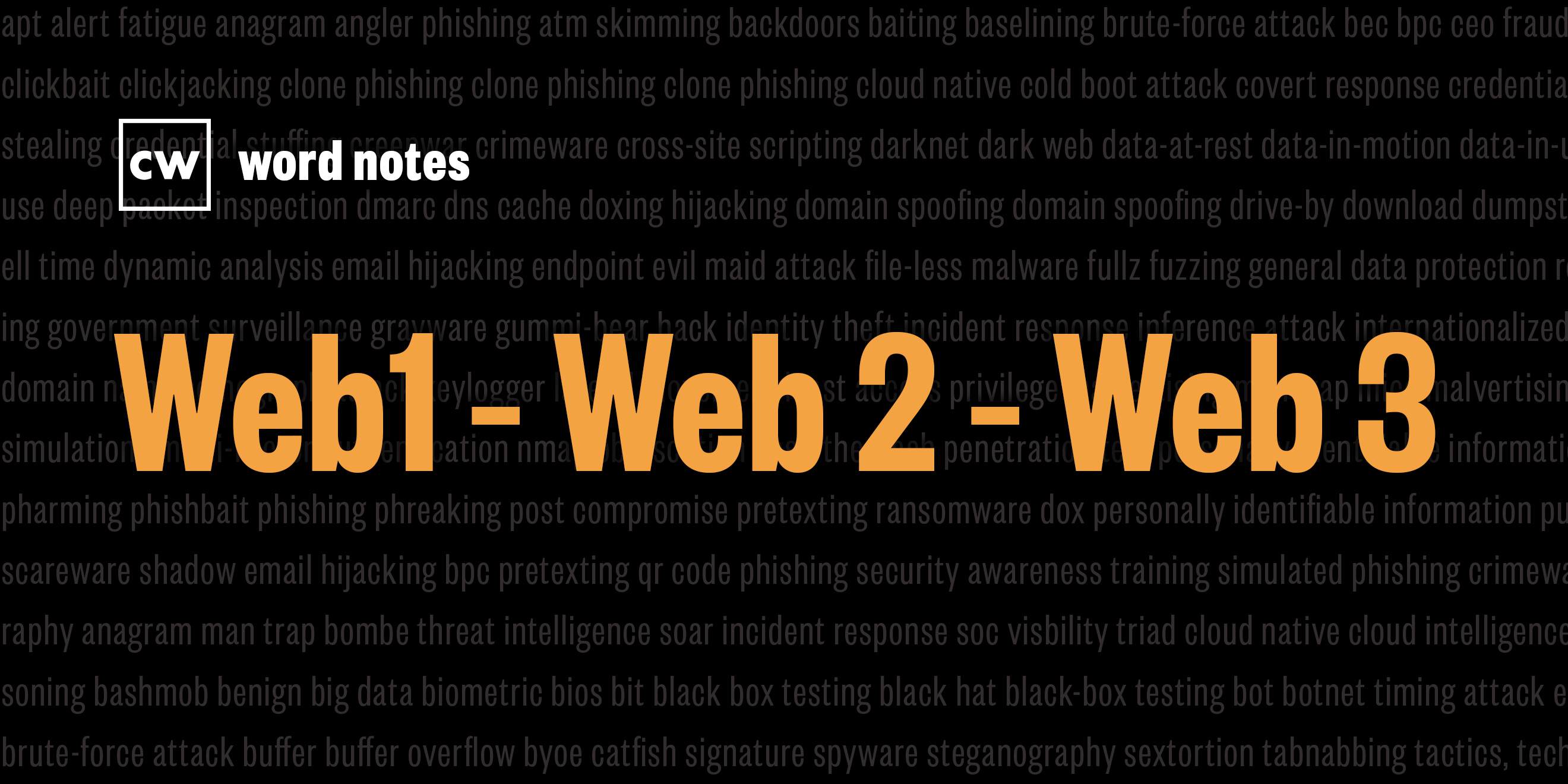
Web 3.0 (noun)
Rick Howard: The word is: Web 3 dot 0.
Rick Howard: Spelled: W as in world, E as in expectation, B as in blockchain and three, as in the next version.
Rick Howard: Definition: The potential next evolution of the worldwide web that decentralizes interaction between users and content away from the big silicon valley social media platforms like Twitter, Facebook, and YouTube, and towards peer-to-peer interaction using blockchain as the underlying technology.
Rick Howard: Example sentence: Web 3 dot 0 would theoretically give users more privacy by taking power away from major third-party data brokers.
Rick Howard: Origin and context: Web 1 dot 0, which lasted from about 1991 to 2004, refers to the time when websites were mostly static content. Web creators established a domain name, stood up a web server on that corner, and built webpages for specific topics that included hot links to other sources of information on the site or to other web creators.
Rick Howard: Nader Dabit from Free CodeCamp describes this as "the read-only web." Web 2 dot 0 refers to the internet in its current form, marked by interactive websites owned by several massive companies. This is most clearly seen in social media. In 2020, Charles Silver, the CEO of Permissions dot io, said in a Forbes Magazine essay that, quote " Web two O's business model relies on user participation to create fresh content and profile data, to be sold to third parties for marketing purposes. Indeed, the internet has become a massive app store, dominated by centralized apps from Google, Facebook, and Amazon, where everyone is trying to build an audience, collect data and monetize that data through targeted advertising. In my opinion, the centralization and exploitation of data and the use of it without users' meaningful consent, is built into Web 2 dot 0's business model," end quote.
Rick Howard: Web 3 dot 0 refers to the relatively new idea of a decentralized internet built upon blockchain or peer-to-peer nodes, perhaps through the metaverse that investors are currently pouring money into, giving users more sovereignty over their own data.
Rick Howard: Chris Dixon, a partner at Andreessen Horowitz, says that Web 3 dot 0 quote "combines the decentralized community-governed ethos of Web 1 dot 0 with the advanced, modern functionality of Web 2 dot 0. Critics of the idea argue that it's not technically feasible, or that major corporations will still control this version of the internet. Regardless Web 3 dot 0 is another manifestation of tech researchers and investors realizing that internet consumers may not particularly like the current situation and would pay for other models. They think that the typical internet user doesn't like the idea that all of their traffic must traverse a small handful of internet tech giants whose business model is to monetize those user's personal information. We see that in new Identity and Access management models, and now we're starting to see it for general purpose internet traffic.
Rick Howard: Nerd reference: In December 2021, Clayton Morris from Crypto News Daily played a clip from Elon Musk describing his skepticism of Web 3 dot 0 technology. He says that it feels more like marketing than reality.
Elon Musk: I don't know if I necessarily buy into this metaverse stuff. Um, although people talk to me a lot about it. Like I said, I don't be like, you know, some old, some old codger, sort of dismissing the internet in 95 is not automatic to anything. So there's some danger to that, that's the case. Uh, I, I currently am unable to see a compelling metaverse situation, um, or web three sounds like more marketing than reality. I don't get it, you know, and maybe I will. So, but I don't get it yet. Let me put it that way
Rick Howard: Word Notes is written by Tim Nodar, executive produced by Peter Kilpe, and edited by John Petrik and me, Rick Howard. The mix, sound design, and original music have all been crafted by the ridiculously talented Elliott Peltzman. Thanks for listening.

